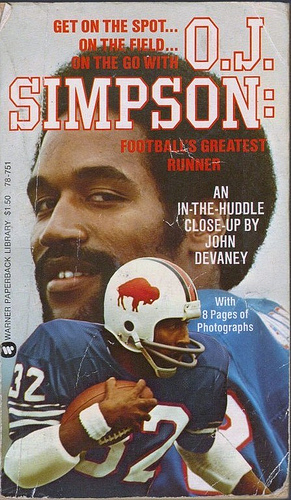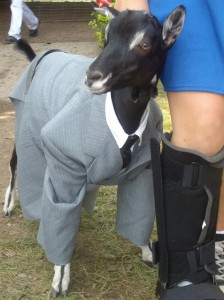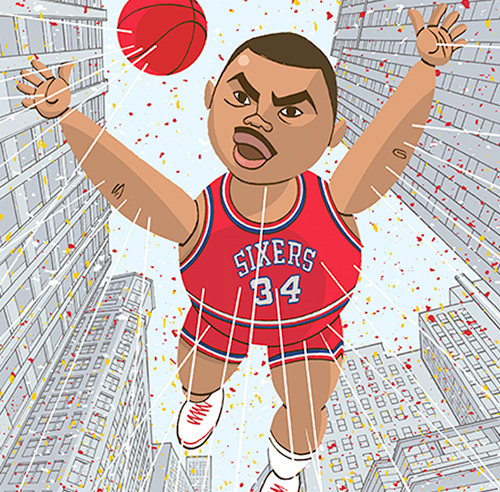The Undisputed Guide.
Lying around my childhood room somewhere is a commemorative set of basketball cards from the 1992 NBA Draft. The whole gang is there: Shaq looking svelte; Christian Laettner looking white; LaPhonso Ellis looking weird; Marlon Maxey looking cool; Tony Bennett looking like a foreigner; Don MacLean looking middle-aged. I used to play with the cards in all kinds of ways. I would organize them based on which players had the highest Q-ratings in my wing of the home, and Anthony Peeler would be on top. Then I would reorganize them so that the players were sequenced by conference, with a sub-categorization for alphabetical team listings. I would create dream starting fives, I would stare quizzically at Clarence Weatherspoon, I would wonder for extended periods about how Brian Davis got the lines of his haircut to be so crisp and clean. Once, I spent what felt like an hour reorganizing the letters in Litterial Green's name to create as many partial anagrams as possible.
More than anything else, I would shuffle the cards into a confused, incoherent sequence before reimplementing the unyielding rigidity of the draft order. Shaq on top, always, followed by Alonzo Mourning, whom I presumed, given his proximity to Shaq, was destined to be pretty much as good. My dad would caution that Alonzo was overrated, but the cards said otherwise, and unlike my dad, they fit under my pillow when I went to sleep. When you're a ten-year-old, you accept conventional wisdom dispensed by presumed authorities with blind faith. Draft order, sanctioned and celebrated with its own TV show and all sorts of special media attention, was as authoritative as could be. And that was why I couldn't understand why Robert Horry always had to be placed on top of the Harold Miner, Malik Sealy, Tracy Murray, Jon Barry, Oliver Miller, and Byron Houston cards. I had never heard of Robert Horry, and he didn't seem to be so good. What did Alabama ever do in March?
(The internets tell me that he won three SEC conference tournaments and appeared in two Sweet 16s, but bear in mind that I was ten. Ten-year-olds don't care who made it to a mid-March Thursday night. They care about players with nicknames like "Baby Jordan" from schools where older cousins matriculate, and they care about teams in the Final Four. Also, they care about the Fab Five, because that remains the coolest basketball team ever.)

Horry's first year in the NBA validated my then-eleven-year-old's skepticism. He only averaged 10 points per game! He wasn't an All Star! This was the eleventh pick in the draft? His team was alright, but it wasn't really on my television very often. And forget the playoffs, which is the canvas of lasting impression, even for adults. For me, then and now, 1993 consisted of little more than
John Starks going baseline on the Bulls only to see Charles Smith later go baseline
in a much worse kind of way. I also remember those Finals because I hated the Phoenix Suns and resented that they'd even had the temerity to validate the Charles Barkley acquisition by winning the Western Conference. Houston went out against Seattle that year. Though I was by then staying up far too late and watching far too much basketball, I can assure you that I remember almost nothing of a series that usually tipped off each evening as my classmates were nodding off. I probably saw more Horry that year during the hazy moments of a second half as I'd struggle to locate the remote and turn off the television in my room than I did at any other time. No matter what the order of the cards said, he was not very good. I was certain of it, and I am sure I said so at school during at least one of the many morning meetings I'd take hostage with unsolicited basketball commentary.
We all know what happened the next season: Michael Jordan retired, Houston tipped the Knicks in seven games to win the championship, O.J. Simpson killed two people, Pat Riley absconded to Miami, and the New York-Miami rivalry was born. (Plug: There is an entire essay about this most curious kinstrife in FD's
Undisputed Guide to Pro Basketball History, which you should buy.) I watched the Rockets against the Knicks with ferocity. Twelve-years-old at that point, I was the second-greatest basketball expert I knew, and my credibility was on the line. Only my dad surpassed me, and I was often reminding him to open his eyes as Finals games crept passed
his bedtime.
Applying such keen focus for seven games, my dad and I settled into a rhythm--something I only recognized later in life--that persists to this day. We create our own memes when we watch basketball together. We are each other's best, most rapt audience, and as we share ideas and echo sentiments, we establish shared wisdom that quickly becomes gospel. (We also make all the same noises at all the same times because we're sick in the head.) This is a pathology that surely started before the 1994 NBA Finals, but that series stands as a definitive moment in my relationships with my dad and with basketball because our banter was codified in a special way: it was only then that I finally grasped what it meant to be a team, and why Robert Horry might have merited his place among the cards.

Hakeem's championship Rockets were the first great
team I can recall from personal experience. I grew up with the appropriate level of respect for the 80s Lakers and Celtics, and I knew enough about the Bad Boys to understand their place in history, but I based those admiring verdicts on hearsay. I was instructed, and I assimilated the lessons. The Bulls, too, fielded great teams, but with Michael and Scottie, Chicago always seemed like two stars and a supporting cast. Especially to a little boy.
Houston, though, was different. I had watched
Hakeem Olajuwon own Patrick Ewing for years, and Hakeem's grace, intelligence, and skills were readily apparent. Hakeem was great. However, no other player on the roster seemed like anything more than average. In fact, among the ten Rockets who played the most minutes that season, the only other players to ever appear in All Star games were Otis Thorpe, in 1992, and Sam Cassell, in 2004, well after he played for Houston. All Star games are not a dispositive criterion for any full evaluation of a player, of course, but think about that again: over the entirety of their careers, Hakeem's nine most important teammates from that season made two All Star teams, collectively. Houston was not a champion predicated on having the most talent.
Instead, Houston had the best component parts, and my father and I were mesmerized by it. Consider the point guard position. As we still say today in my household, Kenny Smith may have started for those Rockets, but Sam Cassell was the finisher. A rookie closer, in fact. Together, Smith and Cassell were ideal complements. Smith was able to keep defenses honest with his shooting while applying his athleticism in various ways, and Cassell was able to infuse energy, tenacity, and fearlessness, all crunch-time assets which Smith did not provide as readily. Individually, neither was a perfect point guard, and neither stood on his own merits among the better players at the position. But on a Rockets team anchored solely by Hakeem and a proud facelessness, the Smith-Cassell combination worked.
It was that way across the roster. For many teenage years, I carried around more esteem for Otis Thorpe than anyone outside of his family because despite never providing Karl Malone numbers, Thorpe was dazzling as a workman. More specifically, he provided basketball assets that were unassuming but crucial, and he did so on a team crafted for that purpose. (I also liked Thorpe's gaunt appearance and
sinewy style. He was sort of like a Halloween skeleton brought to life.) Houston was not a Super Friends outfit stocked with Hall of Famers, an extension of the two-stars-and-a-crew model, nor a collective of the very good assembled around Hakeem. Instead, the 1994 Rockets were like the Duncan Spurs, only without as much Russian-culture graduate-degree work, talent, and
timeless humor. During the championship years, Manu and Tony Parker were probably better, relative to their peer set, than the non-Hakeem Rockets were to theirs. Yet both teams shared an abiding faith in the maxim that the whole can be greater than the sum of its parts. The Rockets may have forever struck the best NBA balance among the worth of the raw materials and the marginal value of the finished product. (Maybe 1977 Trail Blazers partisans would protest otherwise.)

Houston's basketball modality was a revelation to behold, particularly for New Yorkers accustomed to outsized hype and the Knicks' tenuous grasp on functioning teamwork. For years, New York was always one player away--nevermind that the one player was never going to be an addition, but the subtraction of Michael Jordan. So the Brickers would bring in some shiny new piece, or consummate some critical trade, and hope that another amassed weapon would find the right place in the arsenal. This usually worked well, though never well enough, and the contrast with Houston was striking. Vernon Maxwell, Mario Elie, and Carl Herrera were not the missing pieces that captivated the imagination of a Knicks fan, but those standard-issue basketball professionals made critical contributions to the Rockets. As we watched, my father and I were resigned to acknowledging that Houston was "tough"--a team that executed effectively, placed constant strain on an opponent by relying on refined everyday contributions from everyone, and was mentally steeled for a fight.
Mr. Eleventh Pick fit right in on the 1994 Rockets. Horry was a lanky swingman who assisted in the modern cause to strip that term of its ugliness. He would hit jumpers, pogo around near the hoop for rebounds and diving one-handers, play excellent defense, and demand little in return. Not particularly strong or thick, he instead blocked shots on the weak side, challenged shots straight up, and made the right defensive switches down low and up top. Horry was almost always involved with winning time--offering a portend of a career spent as indispensable--and that inescapable reality quickly leaped out at my father. Not just "tough," Horry was gifted within Houston's system. A team that asked for each of its members only to provide what they could in a replicable and reliable fashion asked Horry to provide a little of everything, but never too much of any one thing. I had a harder time immediately appreciating a guy who averaged only 11 and 6 in the playoffs after a childhood within the NBA's galaxy of stars and superstars, but it came to me as I sat in the basketball echo chamber with my dad. Moving away from disappointment and skepticism, I eventually anointed Horry as a sure star on the rise, engaging in some classic, pre-adolescent overcompensation.
As we all know, Horry netted out somewhere between the two poles of undeserving lottery pick and should-be Hall of Fame player. His career, however it is classified, holds special meaning for me. Though no one ever should or will replace Hakeem as the symbol of the mid-90s Rockets, Horry was arguably more Houston than anyone else. On a team of everymen, he was among the finest, and his style captured Houston's ethos in a fashion belied by Hakeem's exceptionalism. Horry also authored a career of winning that still challenges the conventional methods of measuring basketball accomplishment. I just wish I could now manipulate time and convince my ten-year-old self to think this way. I likely would have spent less time in my room with those cards and more time savoring a basketball
team in the proper sense of that word.




























